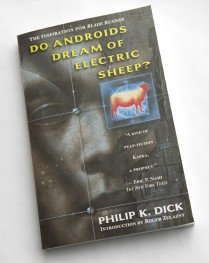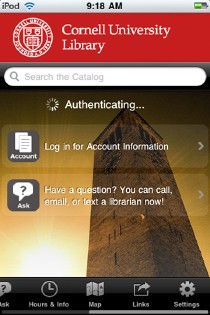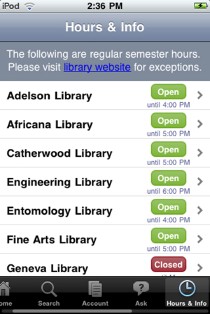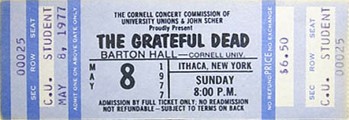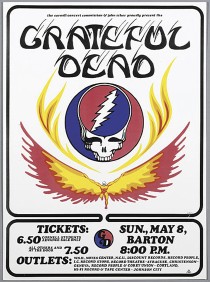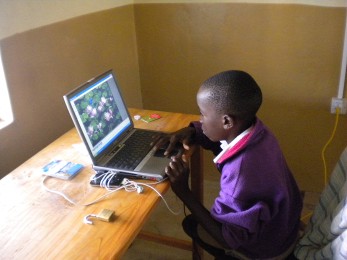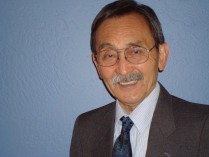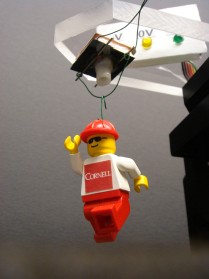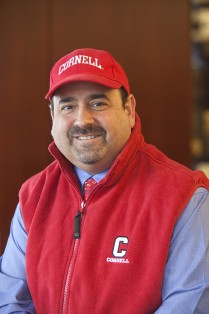THE ESSENTIALS
THE ESSENTIALSReading project takes on the future of humanity
The Cornell community is taking a leap into the future with the 2010 New Student Reading Project, which will focus on Philip K. Dick's 1968 science fiction novel, "Do Androids Dream of Electric Sheep?" -- the basis for Ridley Scott's 1982 film "Blade Runner" and an influential work of post-apocalyptic fiction.
"[The book] generates a range of engaging topics for discussion and exploration, including technology, artificial intelligence, the environment, the future, the human, the real (as opposed to the artificial), the idea of design or creation, the status of art and the ineluctable force of entropy," wrote Laura Brown, vice provost for undergraduate education, in a letter to deans and vice provosts announcing the selection.
The book will be read by the incoming freshman class and new transfer students, and by faculty and staff leading discussions during student orientation in late August.
About 50 fiction titles -- recommended by faculty, staff and several student groups, including Meinig Scholars, resident advisers and orientation leaders -- were considered for the 2010 project. Other books shortlisted for this year were "Timbuktu" by Paul Auster, "Little Black Book of Stories" by A.S. Byatt, and "Slaughterhouse-Five" by Kurt Vonnegut Jr. '44.
The reading project will be supported and enhanced by the Web site reading.cornell.edu, with a blog providing background, context and further resources to explore.
Library now comes pocket sized
Thanks to a computer science class, Cornell University Library now comes pocket-sized.
Members of last fall's software engineering class created an application that offers access to the Library through an iPhone, following a suggestion from the library's student advisory board. Users can check library hours, renew books, search the catalog and use mobile-friendly databases. iPhones can also send text messages to Cornell librarians with any questions, big or small.
"I had a lot of fun supporting the design aspect of the project," says Beth Brown '10, a class member who helped create the app's interface. "I do like the way it came out, so I only hope that other students find it helpful."
The iPhone app is now available in the iTunes App Store (search for "Cornell University Library") or visit labs.library.cornell.edu for the mobile Web site.
Grateful Dead live on in alumni memories of Barton Hall '77
A 1977 concert in Barton Hall, widely considered one of the best shows in the Grateful Dead's 30-year career, was a key event for those who were there. Some alumni fans returned to Barton for a Feb. 14 Furthur concert by Grateful Dead members Bob Weir and Phil Lesh.
The venue's legendary association with the band still drew Deadheads old and young -- the Furthur show sold 4,300 of 5,000 tickets in one week, on its way to a sellout; and New York Times readers reaffirmed the long-held preference of aficionados and voted Barton '77 the best Dead show of all time in an April 2009 online poll.
"The [May 8, 1977] Cornell show is right up there at the top," says Mike McEvoy '78, a Cornell Concert Commission alumnus.
After an audience member's tape and a high-quality soundboard recording began circulating among fans, the show became legendary.
"I started hearing from other Deadheads that the Barton show was famous," says Brad Krakow '78, who characterized the Dead's performance as "tight, no mistakes and inspired. It is funny now when friends ask if that is 'The' Barton Hall when visiting. It is an icon."
Plugged-in in Kenya
Darragh Caldwell '04, who runs a business incubator in Cleveland, has assisted 12 startup businesses in the past two years. One of these, Sunflower Solutions, produces movable solar panels that power the Mbaka Oromo Primary School in rural western Kenya.
The school has another Cornell connection: On March 6, 2009, students in the Business Opportunities in Leadership and Diversity program raised $700 to provide the school with computers and solar power.
Above: A student at Mbaka Oromo Primary School was one of the first at the school ever to use a computer donated by Cornell, thanks to power generated by Sunflower Solutions' solar power system. The school now has Internet access over a cellular network.
After nearly 50 years, 76-year-old receives his Ph.D.Isao Fujimoto, age 76, senior lecturer emeritus at the University of California (UC)-Davis, who helped found the Asian American Studies Program (one of the first in the country) and the Graduate Program in Community Development there, put his Cornell dissertation aside for some 50 years.
But on Feb. 1, Fujimoto finally received his Ph.D. in development sociology from Cornell's College of Agriculture and Life Sciences. His thesis was on multiethnic efforts to organize immigrant communities in California's Central Valley.
In 1961, while working as a high school science teacher in San Jose, Calif., Fujimoto completed a program for science teachers at Cornell and subsequently led a Cornell literacy project in Honduras and settled in to start a doctoral program, doing fieldwork researching village development in the Philippines. In the midst of organizing data for his dissertation in 1967, he was recruited by UC-Davis to join the faculty and develop a program in community development. Putting his dissertation on hold, Fujimoto began an academic career. When he retired from UC-Davis in 1994, he revisited his dissertation.
"The dedication, commitment and focus of the people in organizations I've worked [at] have been a source of energy and inspiration that has kept me going. That's what led me not to give up on completing my Ph.D., even if it took nearly 50 years," Fujimoto said.
New adhesive device could let people walk on walls
Could humans one day walk on walls, like Spider-Man? A palm-sized device invented at Cornell that uses water surface tension as an adhesive bond just might make it possible.
The rapid adhesion mechanism could lead to such applications as shoes or gloves that stick and unstick to walls, or Post-it-like notes that can bear loads, according to Paul Steen, professor of chemical and biomolecular engineering, who invented the device with Michael Vogel, a former postdoctoral associate.
The device is the result of inspiration drawn from a beetle native to Florida, which can adhere to a leaf with a force 100 times its own weight, yet also instantly unstick itself. Research behind the device was published online Feb. 1 in Proceedings of the National Academy of Sciences.
The device consists of a flat plate patterned with microscopic holes. A bottom plate holds a liquid reservoir, and in the middle is another porous layer. An electric field applied by a common 9-volt battery pumps water through the device and causes droplets to squeeze through the top layer. The surface tension of the exposed droplets makes the device grip another surface -- much the way two wet glass slides stick together.
'Sidelines' is new CornellCast sports interview program
"Sidelines," a new weekly show featuring interviews with Big Red coaches and athletes, debuted in February.
Presented by CornellCast, the show is available on demand each Tuesday at 7 p.m. at cornell.edu/video/ as well as on iTunesU; Cornell's dedicated channel on YouTube at www.youtube.com/user/CornellUniversity; and locally on Time Warner Cable's Tompkins County Channel 13.
The first show featured men's basketball coach Steve Donahue, who will take the Big Red to the NCAA Tournament for the third consecutive year.
Blaine Friedlander, assistant director of the Cornell Press Office, hosts the show. Interviews last 15 to 30 minutes.
CornellCast is Cornell's Internet television channel featuring recent recordings of lectures, discussions and performances by Cornell community members and distinguished guests.
